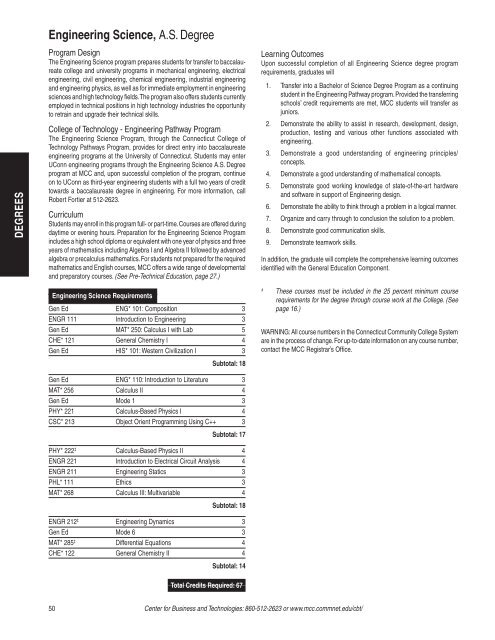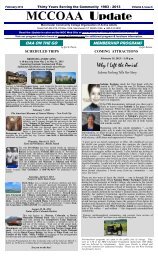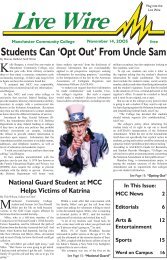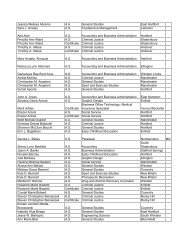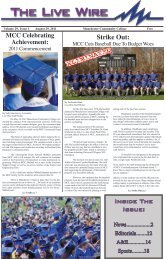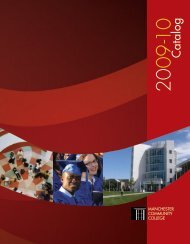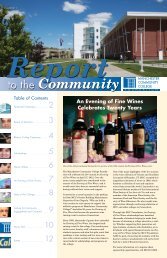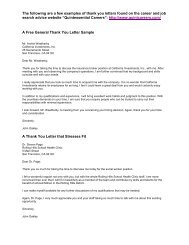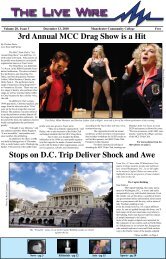Liberal Arts and Science - Manchester Community College ...
Liberal Arts and Science - Manchester Community College ...
Liberal Arts and Science - Manchester Community College ...
You also want an ePaper? Increase the reach of your titles
YUMPU automatically turns print PDFs into web optimized ePapers that Google loves.
DEGREES<br />
Engineering <strong>Science</strong>, A.S. Degree<br />
Program Design<br />
The Engineering <strong>Science</strong> program prepares students for transfer to baccalaureate<br />
college <strong>and</strong> university programs in mechanical engineering, electrical<br />
engineering, civil engineering, chemical engineering, industrial engineering<br />
<strong>and</strong> engineering physics, as well as for immediate employment in engineering<br />
sciences <strong>and</strong> high technology fields. The program also offers students currently<br />
employed in technical positions in high technology industries the opportunity<br />
to retrain <strong>and</strong> upgrade their technical skills.<br />
<strong>College</strong> of Technology - Engineering Pathway Program<br />
The Engineering <strong>Science</strong> Program, through the Connecticut <strong>College</strong> of<br />
Technology Pathways Program, provides for direct entry into baccalaureate<br />
engineering programs at the University of Connecticut. Students may enter<br />
UConn engineering programs through the Engineering <strong>Science</strong> A.S. Degree<br />
program at MCC <strong>and</strong>, upon successful completion of the program, continue<br />
on to UConn as third-year engineering students with a full two years of credit<br />
towards a baccalaureate degree in engineering. For more information, call<br />
Robert Fortier at 512-2623.<br />
Curriculum<br />
Students may enroll in this program full- or part-time. Courses are offered during<br />
daytime or evening hours. Preparation for the Engineering <strong>Science</strong> Program<br />
includes a high school diploma or equivalent with one year of physics <strong>and</strong> three<br />
years of mathematics including Algebra I <strong>and</strong> Algebra II followed by advanced<br />
algebra or precalculus mathematics. For students not prepared for the required<br />
mathematics <strong>and</strong> English courses, MCC offers a wide range of developmental<br />
<strong>and</strong> preparatory courses. (See Pre-Technical Education, page 27.)<br />
50<br />
Engineering <strong>Science</strong> Requirements<br />
Gen Ed ENG* 101: Composition 3<br />
ENGR 111 Introduction to Engineering 3<br />
Gen Ed MAT* 250: Calculus I with Lab 5<br />
CHE* 121 General Chemistry I 4<br />
Gen Ed HIS* 101: Western Civilization I 3<br />
Subtotal: 18<br />
Gen Ed ENG* 110: Introduction to Literature 3<br />
MAT* 256 Calculus II 4<br />
Gen Ed Mode 1 3<br />
PHY* 221 Calculus-Based Physics I 4<br />
CSC* 213 Object Orient Programming Using C++ 3<br />
Subtotal: 17<br />
PHY* 222 ‡ Calculus-Based Physics II 4<br />
ENGR 221 Introduction to Electrical Circuit Analysis 4<br />
ENGR 211 Engineering Statics 3<br />
PHL* 111 Ethics 3<br />
MAT* 268 Calculus III: Multivariable 4<br />
Subtotal: 18<br />
ENGR 212 ‡ Engineering Dynamics 3<br />
Gen Ed Mode 6 3<br />
MAT* 285 ‡ Differential Equations 4<br />
CHE* 122 General Chemistry II 4<br />
Subtotal: 14<br />
Total Credits Required: 67<br />
Learning Outcomes<br />
Upon successful completion of all Engineering <strong>Science</strong> degree program<br />
requirements, graduates will<br />
1. Transfer into a Bachelor of <strong>Science</strong> Degree Program as a continuing<br />
student in the Engineering Pathway program. Provided the transferring<br />
schools’ credit requirements are met, MCC students will transfer as<br />
juniors.<br />
2. Demonstrate the ability to assist in research, development, design,<br />
production, testing <strong>and</strong> various other functions associated with<br />
engineering.<br />
3. Demonstrate a good underst<strong>and</strong>ing of engineering principles/<br />
concepts.<br />
4. Demonstrate a good underst<strong>and</strong>ing of mathematical concepts.<br />
5. Demonstrate good working knowledge of state-of-the-art hardware<br />
<strong>and</strong> software in support of Engineering design.<br />
6. Demonstrate the ability to think through a problem in a logical manner.<br />
7. Organize <strong>and</strong> carry through to conclusion the solution to a problem.<br />
8. Demonstrate good communication skills.<br />
9. Demonstrate teamwork skills.<br />
In addition, the graduate will complete the comprehensive learning outcomes<br />
identified with the General Education Component.<br />
‡ These courses must be included in the 25 percent minimum course<br />
requirements for the degree through course work at the <strong>College</strong>. (See<br />
page 16.)<br />
WARNING: All course numbers in the Connecticut <strong>Community</strong> <strong>College</strong> System<br />
are in the process of change. For up-to-date information on any course number,<br />
contact the MCC Registrar’s Office.<br />
Center for Business <strong>and</strong> Technologies: 860-512-2623 or www.mcc.commnet.edu/cbt/


